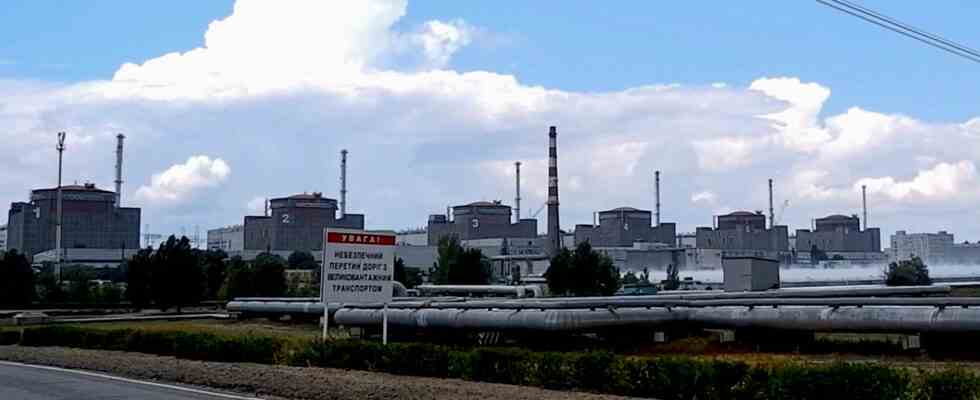Status: 11.08.2022 18:02
Fighting continues at Zaporizhia nuclear plant in Ukraine. Not only does President Selenskyj warn of a nuclear catastrophe, UN Secretary-General Guterres is also “deeply concerned”. The main problem seems to be the power supply of the nuclear power plant.
The Zaporizhia nuclear power plant in Ukraine, which was occupied by Russian troops, has again come under fire. Ukrainian operator Enerhoatom said there had been five Russian attacks near a radioactive substance storage facility. A representative of the pro-Russian authorities in the region, Vladimir Rogov, wrote in the online service Telegram that Ukrainian troops had again shelled the nuclear facility.
Heavy shelling has been reported from the area around Zaporizhia for days. Russia and Ukraine blame each other for the attacks in southern Ukraine.
conflicting parties as a source
Information on the course of the war, shelling and casualties provided by official bodies of the Russian and Ukrainian conflict parties cannot be directly checked by an independent body in the current situation.
Expert: Power supply is the “lifeline” of the nuclear power plant
The nuclear power plant in Zaporizhia is the largest in Europe. Russian troops took control of it in March, shortly after beginning their war of aggression. A reactor had to be shut down after the attacks over the weekend. Concern is growing worldwide that the fighting could result in the power plant no longer being able to be controlled and a nuclear catastrophe occurring – similar to that in Chernobyl in 1986.
According to the Greenpeace nuclear expert Heinz Smital, the power supply of the power plant is a critical point. It is “the lifeline of a nuclear power plant because it needs to be cooled even when it’s off,” Smital said. If there is a complete failure of both the grid and backup generators, “a meltdown is almost inevitable,” he warned.
“An extremely dangerous mode of work”
The Ukrainian nuclear power plant operator Energoatom announced on Tuesday that Russia wanted to connect the occupied Zaporizhia nuclear power plant to the power grid of the annexed Crimean peninsula. For this, the power lines of the nuclear power plant, which are connected to the Ukrainian energy system, would first have to be damaged, said Enerhoatom President Petro Kotin. Between August 7th and 9th, the Russians had already damaged three power lines.
“Currently, the plant is running on a single production line, which is an extremely dangerous mode of work,” Kotin said. As soon as the last line is cut, the nuclear power plant depends on diesel generators. Greenpeace expert Smital was “very worried” about the Ukrainian information. That is “more relevant than splinters” from attacks that hit the site of the nuclear power plant.
Ukrainian President Volodymyr Zelenskyy also warned of a nuclear catastrophe similar to that in Chernobyl. “We have to protect Europe from this threat,” he said via video link at a Ukraine pledging conference in Copenhagen. Under President Vladimir Putin, Russia is a terrorist state that is holding the power plant “hostage” and using it for blackmail.
BfS: Risk for Germany “relatively low”
However, the Federal Office for Radiation Protection (BfS) does not see any major dangers for Germany. The risk for Germany in the event of a nuclear disaster in Zaporizhia is “relatively low,” said the head of the radiological emergency response department at the BfS, Florian Gering, on the “ZDFheute.de” portal. According to an older study, “fortunately, contaminated air can only reach Germany in 17 percent of all weather conditions,” says Gering. But it could “of course also happen that if the wind is released, contaminated air would come to Germany.”
That was exactly the case at the end of April/beginning of May 1986, after there had been a core meltdown in the then Soviet Chernobyl nuclear power plant. At that time, the radioactive contamination was particularly high in south-eastern Bavaria, where two weather conditions coincided: wind from the east and heavy rain.
In the immediate vicinity of Chernobyl, whole areas of land were so badly contaminated that they are uninhabitable to this day. There were thousands dead and injured. Chernobyl is located in northern Ukraine – not far from the border with Belarus. Zaporizhia is about 520 kilometers south-east of it as the crow flies.
UN Security Council session
UN Secretary-General António Guterres said he was “deeply concerned” about the fighting in Zaporizhia. Unfortunately, there has been no de-escalation in the past few days, “but reports of other deeply worrying incidents.” If these continue, “it could lead to catastrophe,” Guterres said. He appealed to both sides: “I call on the Armed Forces of the Russian Federation and Ukraine to immediately stop all military activities in the immediate vicinity of the plant and not to target its facilities or surroundings.”
At the request of Russia, the UN Security Council – the most powerful body in the United Nations – is today dealing with the situation around the nuclear power plant. The session begins later in the evening German time. The head of the International Atomic Energy Agency (IAEA), Rafael Grossi, is to inform the 15 member states of the Security Council about the situation at the nuclear power plant and also comment on questions of nuclear safety. Alongside China, France, Great Britain and the USA, Russia is a permanent member of the Security Council and has the right of veto there – a condemnation of Russia is thus ruled out.

